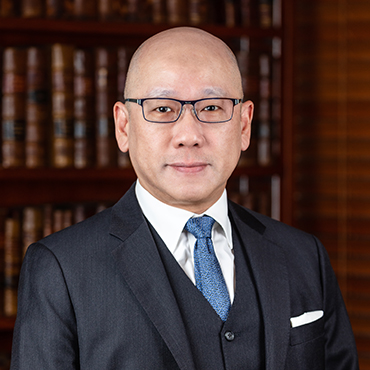HKSAR v Lai Chee Ying (黎智英) (No 2) (2024) 27 HKCFAR 243, [2024] HKCFA 4 (Robert Pang SC)
Robert Pang SC and Simon Kwok represented the 6th and 8th defendants (6th and 7th applicants) in HKSAR v Lai Chee Ying (黎智英) (No 2) (2024) 27 HKCFAR 243, [2024] HKCFA 4.
Ds (D1-6 and D8 at trial) were convicted after trial in the District Court of both organizing an unauthorised assembly (Charge 1) and knowingly taking part in an unauthorised assembly (Charge 2) under s.17A(3)(b)(i) and s.17A(3)(a) respectively of the Public Order Ordinance (Cap.245) (the POO). The charges were based on evidence that Ds had led a procession made up of a huge crowd from Victoria Park to Chater Road, following the route which had been proposed to the Commissioner of Police but prohibited. The Court of Appeal allowed their appeal regarding “organizing” under Charge 1 while it upheld their convictions regarding “taking part” under Charge 2 (see [2023] 4 HKLRD 484). Ds sought leave to appeal from the Court of Final Appeal against their convictions for the “taking part” charge and the prosecution sought leave to appeal with a view to restoring Ds’ convictions for the “organizing” charge. The Court of Appeal had certified a question of law as to the applicability of operational proportionality in Hong Kong courts (the Certified Question), while other proposed questions were set out in the Appendix to the present judgment.
Held, granting Ds leave to appeal solely in respect of the Certified Question, dismissing Ds’ applications relating to their other proposed questions and dismissing the prosecution’s application for leave to appeal, that:
- (1) The Certified Question in relation to the application of an operational proportionality exercise in Hong Kong courts raised issues of great and general importance and leave was granted to all Ds on this matter. (See paras.4, 41.)
- (2) The prosecution’s leave application was not reasonably arguable. Whether Ds could be found to have organized the procession depended on the facts of the present case and did not rest on a superficial application of the dictum in Flockhart v Robinson that a person “who organizes the route is the person who organizes the procession”. In any event that decision was distinguishable on the facts. The word “organize” was an ordinary English word with no specialised, technical or legal meaning (Flockhart v Robinson [1950] 2 KB 498 distinguished). (See paras.12-17.)
- (3) The grounds of appeal proposed by several Ds based on the proposition that Ds had merely involved themselves in a dispersal of an earlier permitted meeting at Victoria Park and thus had not participated in a prohibited procession constituting an unauthorised assembly was not reasonably arguable. The Trial Judge carefully considered and rejected such argument and also found the necessary mens rea was proved and that there was no lawful authority or reasonable excuse. The grounds which relied on challenging those findings were not reasonably arguable and did not constitute grounds appropriate for consideration by the Court. (See paras.18-24.)
- (4) The leave applications based on systemic disproportionality, which focused on the constitutionality of the legislative provision of s.17A(3) of POO, were not reasonably arguable. The statutory maximum sentence under s.17A(3)(a) of POO gave the Court discretion as to possible sentences ranging from non-custodial to the five-year maximum (only on a trial on indictment). Further, the systemic proportionality of the offences under s.17A(3) was implicitly accepted by the Court of Final Appeal in Leung Kwok Hung v HKSAR since the Court had reviewed the notification scheme as a whole and noted the existence of the s.17A(3) offences and the prescribed maximum sentence without raising any question regarding their proportionality, and had held the scheme to be constitutionally valid (Leung Kwok Hung v Secretary for Justice (No 2) [2020] 2 HKLRD 771 approved; Leung Kwok Hung v HKSAR (2005) 8 HKCFAR 229 applied). (See paras.25-34.)
- (5) The ground that the 12-month sentence of imprisonment D4 received for Charge 2 was manifestly excessive was refused. Although the procession turned out to be peaceful, it carried significant risks of violent disorder which the Trial Judge explained justified a deterrent sentence. Nor did D4’s personal circumstances justify a reduction from the starting point. The Court of Final Appeal’s policy on reviewing sentence was also clear, being that it would only contemplate entertaining an appeal in extremely rare and exceptional cases where an important question of sentencing principle arose, which was not the case here (Chu Yiu Keung v HKSAR [2011] 6 HKC 87, Secretary for Justice v Wong Chi Fung (2018) 21 HKCFAR 35 applied). (See paras.35-40.)
[The above is excerpted from the headnote to the report in HKCFAR.]


